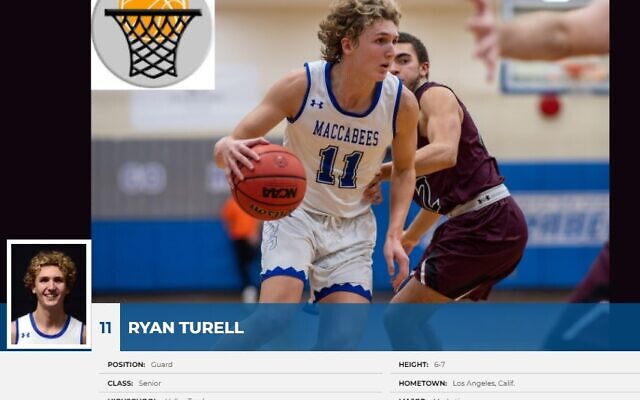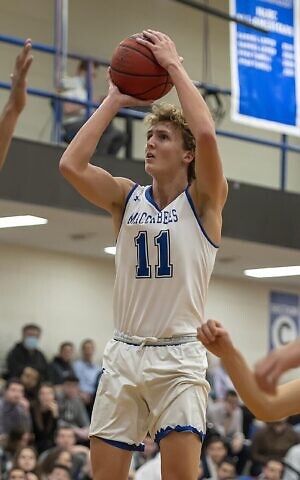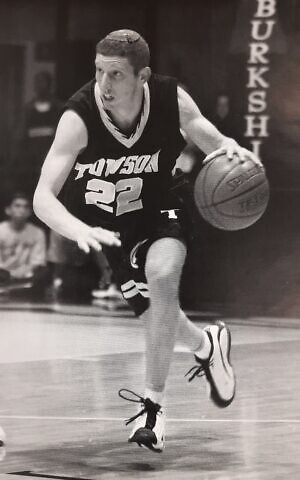The NBA’s Next Jewish Jordan
Only a few Jewish basketball players have ever been given the coveted title.

It started in February 1999, coincidentally, 23 years ago.
Sports Illustrated ran one of its precious few stories on a high school athlete, in this case, Tamir Goodman, the redheaded hoops prodigy out of Talmudical Academy, a small Jewish day school in Pikesville, Md. In the profile, writer Michael Bamberger innocently referred to Goodman, who had recently made an oral commitment to attend the University of Maryland on a basketball scholarship in fall 2000 and was considered a top 25 prospect nationally, as the “Jewish Jordan.” While it may have been a fitting moniker at the time, the “Jewish Jordan” label soon proved to be more of a curse than a blessing for the 17-year-old from the Orthodox community of Upper Park Heights, in the northwest corner of Baltimore.
“I’m a very simple person. I don’t like a lot of noise. I never asked to be called the Jewish Jordan and [for] all that media attention,” Goodman acknowledges today, from Israel, where he is a father of five.
Indeed, once the four-page spread on the “Jewish Jordan” found its way into living rooms and dentist offices across America, Goodman’s fame skyrocketed. Major television networks started airing stories. Hordes of fans started mobbing him for autographs after games. By October, Jerry Seinfeld was doing a “Jewish Jordan” skit on “Saturday Night Live.” There were Friday evenings when Tamir and his father would walk into shul to find camera crews camped out.

The hoopla surrounding Goodman grew so intense, so suffocating, that, by the end of his junior year at Talmudical Academy, the school essentially asked him to leave. It simply didn’t have the infrastructure (i.e., the gym space) to handle the crush of fans and reporters hovering around the 6’3”, 150-lb. point guard. And so, Goodman finished his high school career by enrolling in, of all places, Takoma Academy, a Seventh-Day Adventist Christian high school. Akin to Talmudical Academy, Takoma didn’t schedule games on Saturdays, making it a perfect fit for Goodman, even if he was the school’s only Jew.
While Takoma was perfectly accommodating, Maryland, and ultimately Towson, to which he transferred after his freshman year in College Park, were not. By December 2001, Goodman, who was raised by Holocaust survivors, bolted to Israel, where he began playing for Maccabi Tel Aviv, the first of seven Israeli teams that he would represent before retiring at 27, following a debilitating leg injury.
There would be no Jewish Jordan. At least not one in the NBA.
But now, nearly a quarter-century later, the “Jewish Jordan” discussion has resurfaced with the ascension of Ryan Turell, Yeshiva University’s slick combo guard, who has a killer outside jumper and an outside chance of getting drafted into the NBA this summer. While the media scrutiny and fanfare surrounding Turell in Washington Heights has not been quite as extraordinary as that which accompanied Goodman in the late ’90s, Turrell’s emergence as the best Division-III player in the country (back in November he dropped 51 points on Manhattanville) has rekindled the debate over whether there could ever be an Orthodox Jewish player in the NBA.
From the perspective of some American sports fans, the concept of a “Jewish Jordan” seems like a great oxymoron: How could a highly observant Jew, one who could not take the court on Shabbat, play in the NBA, whose slate of games regularly consists of Friday night and Saturday afternoon tip-offs? It’s a valid question, considering that it relates to not just the professional ranks, but college, too.
Even in regard to Division I hoops, both Goodman and Turell have faced a similar predicament. While Goodman had his well-publicized struggles in college (“When I was coming up it was like, ‘Ok, what are you doing? This is never going to happen. This is impossible. How are you ever going to get a scholarship? Who’s ever going to accommodate you?’”), Turell also found his devotion to Judaism to be problematic when he was getting recruited by D-I schools.
“When I was getting recruited, I was going to go to Army,” explains Turell, whose Yeshiva Maccabees team last month snapped a 50-game win streak but still appear in the running for a national title. “We had a conversation with a bunch of people and we called the rabbi up there. He said it would be really, really difficult to stay a religious Jew, almost impossible.”
After getting similar vibes from other schools, including Stanford, where he was promised a preferred walk-on spot, Turell enrolled at Yeshiva. With Turell holding down its backcourt (he has already been named the U.S. Basketball Writers Association Division III National Player of the Week twice this year), YU’s emergence as a D-III powerhouse has garnered considerable national attention with such mainstream outlets as the Los Angeles Times, Wall Street Journal and espn.com having run stories.
“I expected us at Yeshiva to succeed,” adds Turell. “I didn’t expect this kind of love with all the coverage. It’s a blessing, something I thank God for every day.”
In the D-III landscape, Turell is the proverbial big fish in a small pond. Night in and night out, he’s YU’s leading scorer and NBA teams have taken notice of the team’s standout floor in general. While it’s a tall order for a small school ballplayer to make the jump to the NBA (currently Duncan Robinson of the Miami Heat is the only player with such a background, and he later transferred to Michigan), it remains a distinct possibility that Turell could get some love from the league later this year.
“I know for sure that there’s a lot of interest in him [Turell] at the NBA level just from some of the contacts who I know at the NBA that have been in touch with me,” says Goodman.
Yet, it’s undeniable that had Turell, the active “Jewish Jordan,” gone to a bigtime athletic school, there would have been more exposure on nationally televised Saturday afternoon games.
Any regrets not going down that road?

“I love the decision I made,” Turell responds without hesitation. “I don’t regret it for a second. Hopefully it inspires kids to choose religion and stay religious. They don’t have to go to a D-I place. They can come to Yeshiva and still succeed.”
Thus far, Turell’s basketball journey has mirrored Goodman’s in the sense that both did not compromise their devotion to Judaism for the sake of playing on a bigger stage. And, much like his protégé of sorts, Goodman, who is currently an entrepreneur and runs basketball camps in Israel, believes unequivocally that he himself made the right decision a couple decades earlier.
“I have no regrets. I feel so blessed. I got to live out my dream, play professionally, play on a full scholarship without playing on Shabbat. That was my goal.”
Since maturing into adulthood, Goodman has pursued his professional career with a greater purpose: to show the world at large that Judaism and athletics constitute a beautiful partnership.
“Back in the day it was almost seen as impossible,” the original “Jewish Jordan” recalls. “The world is in a place where it is much more accepting. I just love seeing what’s going on. It’s almost like, ‘Why can’t you be a proud Jewish person and reach your dreams in basketball?’ We’re seeing it in figure skating. We’re seeing it in running. We’re seeing it in the music world. We’re seeing it everywhere now.
“That’s always been my thought process — Judaism is always about uniting the physical with the spiritual. There’s no conflict. It’s just nice to see it out there now.
“Serving God and bettering the world through physical sport is a very special way to live. Judaism is not running away from the world, but it’s about uplifting the world and finding God in everything we are involved in throughout the day. If God gives us a talent in basketball, or whatever it is, it’s our job to uplift and enhance the world through it as much as possible.”
Back in the ’90s, when Goodman was coming of age on the Baltimore playground courts, it wasn’t always easy being an Orthodox hoopster. With his ubiquitous kippah and killer crossover. In both organized competition and pick-up games, opponents would question his head covering and make comments about kosher food. For many observers, who did not necessarily have anti-Semitic leanings, he was still this object of great curiosity, a freak of nature. How can a Jew be so gifted at basketball?
Unbeknownst to many sports fans, there have actually been quite a few Jewish NBA players. While there is only one currently in the league (Deni Avdija, of the Washington Wizards), the league has been graced by the likes of Hall of Famer Dolph Schayes, Omri Casspi and Ernie Grunfeld, among others. But never one who identifies as Orthodox. That is where Turell, who started wearing a kippah as a senior at Valley Torah High School, enters the picture.
“This is something I definitely embrace,” says Turell, who is very interested in pursuing a career in real estate if this basketball gig doesn’t work out. “I have a goal in mind and I’m not just trying to do it for myself. I’m trying to do it for all the Jews around the world that want to make it.”
In a sense, there is not as much pressure on Turell as there was on Goodman. While the spotlight was beaming exclusively on the latter’s individual accomplishments, Turell’s story has drawn national attention because his team is historically great.
“I am extremely proud [of Yeshiva],” says Goodman, who, admittedly, has no personal relationship with Turell. “On so many levels what they are doing is so extremely special and I think it’s going to have a very positive impact for many years to come. He [Turell] is in a phenomenal program. He has a great strong family behind him and great coaching staff. He’s doing all the right things.”
Any advice for the next “Jewish Jordan”?
“Never let society dictate what you can or cannot accomplish.”
- David Ostrowsky
- Sports
- Local
- Ryan Turell
- Yeshiva University
- NBA
- University of Maryland
- Tamir Goodman
- Towson University
- Judaism
- Basketball
- Sports Illustrated
- Jewish Jordan
- Israel
- Orthodox community
- Jerry Seinfeld
- Talmudical Academy
- Takoma Academy
- a Seventh-Day Adventist Christian high school
- Holocaust Survivors
- Maccabi Tel Aviv
- Shabbat
- Division I
- scholarships
- Yeshiva Maccabees
- Army
- Stanford
- U.S. Basketball Writers Association Division III National Player of the Week
- ESPN
- Division III
- Duncan Robinson
- Miami Heat
- entrepreneur
- basketball camps
- anti-Semitic
- Deni Avdija
- Washington Wizards
- Dolph Schayes
- Omri Casspi
- Ernie Grunfeld
- Kippah
- Valley Torah High School



comments